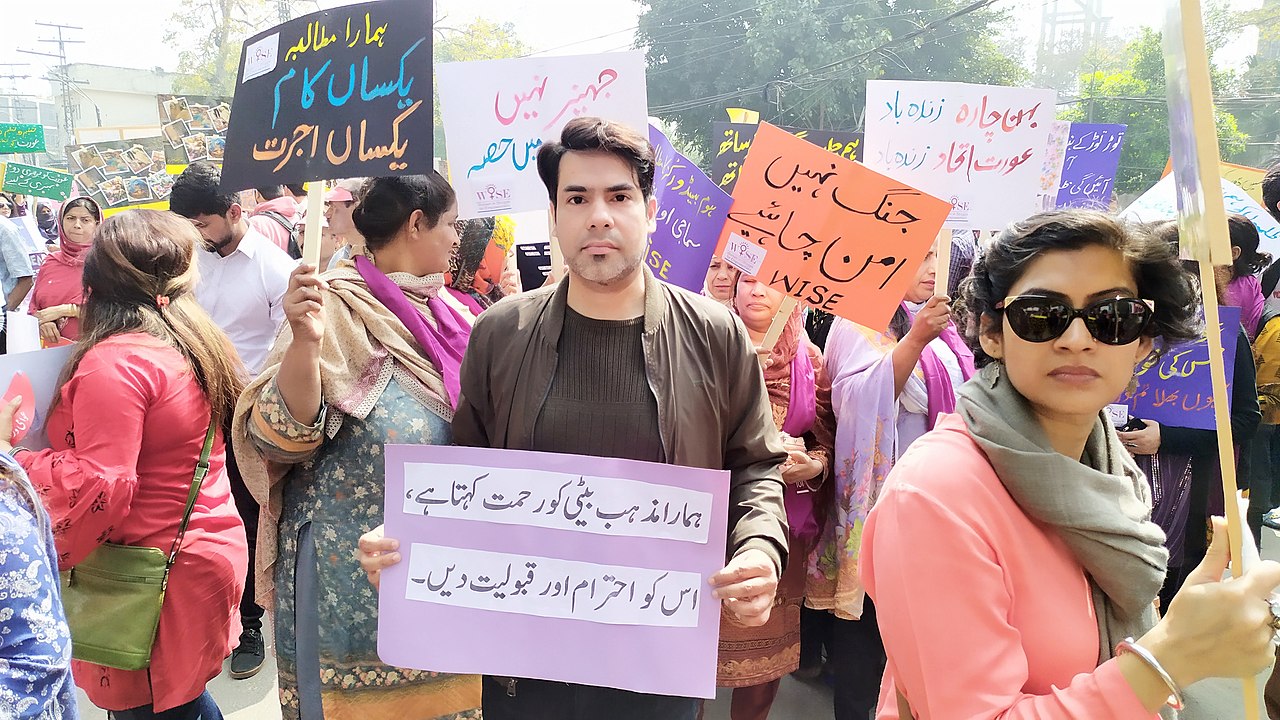
Men also joined Aurat March 2020 outside Lahore Press Club to support women’s rights
Hardliners launched an online campaign threatening to use blasphemy against the participants of Women’s Day marches in Pakistan. It has not only put many people’s lives in danger, making them vulnerable to be killed but also has exposed the intolerant environment of Pakistani society where space is shrinking for liberal voices.
By Aftab Alexander Mughal 16 March 2021
On 8 March, thousands of Pakistani women celebrated International Women’s Day (IWD), by organising the 4th Annual Aurat Azadi March (women freedom march) in many parts of the country. The women marched, carried placards, and voiced their demands. They demanded to be given equal rights and challenged the inhuman behaviour to which women are subjected.
Human Rights Commission of Pakistan, an independent body, issued a press release on International Women’s day, demanded an end to gender-based violence, domestic abuse, rape, and so-called honour crimes, forced conversions, trafficking and harassment at the workplace.
Women have been organising women marches on IWD for years. For the last four years, these marches have gained more media attention, triggered debate and become a target of criticism by the conservative section of society. They raise critical questions regarding the crimes against women, their slogans against sexual harassment, right to marriage, underage marriage, and for a future without oppression, for which many in the society are not ready.
According to Human Rights Watch, an international human rights body, child marriage remains a serious problem in Pakistan. About 21 percent of girls marrying before age 18 while 3 percent marrying before age 15. “Women from religious minority communities remain particularly vulnerable to forced marriage.”
The criticism towards the Women’s Day March participants comes from the hardliners, who say that women already enjoy full rights in Pakistani society because almost 1400 years ago Islam ensured equal rights to be given to women. These hardliners condemn these women as they suggest that they want to promote Western values, which are not acceptable in an Islamic society.
Anti-march elements launched a smear campaign against the march participants by blaming them for raising blasphemous slogans. Fake and distorted video footage of women participants in Karachi, the largest city of Pakistan, were resealed which were widely shared via social media.
Controversial blasphemy law carried the death sentence and triggers violence against an alleged blasphemer. Since the 1980s, after the introduction of the law, about 74 people (Christian, Muslim and Ahmadis) have been killed by fundamentalists. An allegation of blasphemy is a call of death. In 2011, Governor Salman Taseer of Punjab province was killed by his bodyguard, because he demanded the release of a poor woman Asia Bibi, a Catholic mother of five, who was allegedly arrested under the blasphemy law and sent to jail. She spent almost nine years in jail before she was released by the Supreme Court of Pakistan and flew to Canada for safety reasons.
Sania Nasir writes in The News on Sunday, “The women of Pakistan proudly celebrate Women’s Day each year. The country suffers from its fair share of problems when it comes to the treatment of its female citizens.”
Besides, religious-right, a number of right-wing TV anchors became part of the anti-march campaign. When they were challenged by women groups, some changed their position. However, some kept repeating the same allegations, which have no proof.
Anti-march campaigners used different tactics to malign march organisers. A politician showed a photo of a flag during a television show. He claimed that it was a French flag. Women march organisers said that it was actually the flag of a Pakistani feminist organisation. Last year, many Pakistanis organised demonstrations against French President Emmanuel Macron after the publication of cartoons in France. Many consider these cartoons to be blasphemous.
In Lahore on Saturday, Special Advisor to the Prime Minister on Religious Harmony, Tahir Mehmood Ashrafi, declared the slogans were against the ideology and the Constitution of Pakistan.
The Federal Minister for Religious Affairs, Noor-ul-Haq Qadri, announced on Sunday that an inquiry was being conducted against alleged blasphemous slogans raised during the march. The government wanted to reach the truth and if someone is involved in changing and circulating the misleading video clips on social media, they would be taken to task.
Aurat Azadi March (AAM) said that they did not chant disrespectful slogans in the march on the occasion of International Women’s Day and their video was purposefully edited to show them in a negative light. They asked their sympathisers, “Raise voice on social media to refute and debunk these patently false allegations.” The Awami Workers Party (AWP) condemned the right-wing extremist groups’ campaign against women. They party said on Tuesday, “These allegations represent a direct threat to the lives of women who have completely altered the public debate on Pakistani feminism and represent the best traditions of contemporary progressive politics.”
Knox Thames, a former special advisor on religious minorities at the U.S. State Department, writes in the Foreign Policy magazine on 14 March, “Pakistanis, who protest abuses and advocate for a more tolerant society risk their lives.”
